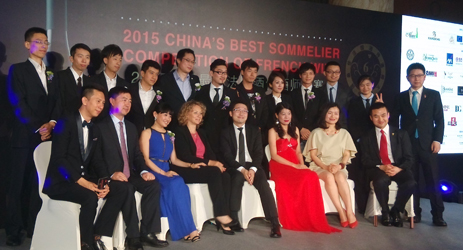Demei's View - Wine Communication from a Chinese Winemaker
It takes a lot of people's love and care to complete the life of a wine from birth to being enjoyed. Who is the most important among these people? The answer might vary, but for me, it is the sommelier - of course I am talking about the serious and qualified ones, not those sommeliers in name only.

Being a sommelier requires rich knowledge of wine and beverages, as well as the skill of tasting; and this is just the basic condition of the job. As a sommelier, you should have enough experience of food and wine pairing - you should at least know the pairings from your own menu and wine list. If you want to stand out from your peers in the same hotel or restaurant, the ability to compile wine lists and discuss the menu with the chef is required. Moreover, a good sommelier should have excellent oral communication skills and a good psychological quality...... It sounds like we are looking for a superman who can deal with everything. In fact, all we want is for the sommelier to guide the customer to buy the wine and drink it happily. Thus, as a winemaker, I sincerely think that the importance of a sommelier is far more significant than that of any other position in the wine industry in terms of realising the value of a wine.
However, the important tasks are normally those not easy to do.

In an immature primary consumer market, sommeliers are facing difficult tasks - as mentioned above, they need to have all kinds of skills, like a superman. Good psychological qualities and communication skills are particularly important. Sometimes customers are lacking a basic and systematic wine knowledge. They might fear wine, or be unable to express what they want, or emphasise too much their own little bit of smattering wine knowledge. However, sommeliers should not try to 'lecture' the customers - being a sommelier is different from being a teacher, and a sommelier should not simply preach at his or her customers. I was thinking about this during the judging of a sommelier competition I recently attended.
The contestants of that competition were from different countries. Apparently Chinese contestants spent more time introducing the wine - regions, grape varieties and styles etc. In contrast, contestants from North America spent much less time talking about the wine, but paid more attention to the details of their service. This might be due to the different professional habits they develop because of the different types of customers they face every day?
The competition was the Shangri-La Hotels and Resorts Internal Sommelier Competition, held at Jing An Shangri-La, West Shanghai on 29 August this year. The contestants came from 18 hotels within the group around the world. Coming from 10 different countries, 26 sommeliers attended the preliminary round, with 13 of them going through to the semi-final, after a theory test and the evaluation of service operations and tasting skills. Eventually there were five contestants from five different countries making it to the final. Although there were many Chinese sommeliers in the preliminary round, only one of the five finalists was Chinese. I think it is fair to say that this is the portrayal of the standard of the current Chinese sommelier team.

The Shangri-La Hotels and Resorts has always been concerned about sommelier training programme and the development of its wine list. It has arranged many internal training in the past, and invited LU Yang, a popular Chinese sommelier to join the group and take the position of wine director in 2012. Based on the previous training programmes, LU Yang strengthened the internal sommelier training. In addition to his own lectures, he also invited wine experts with different professional backgrounds in the wine industry to give lessons, and achieved good results. In the 2013 China National Sommelier Competition, seven of the 10 finalists were from the Shangri-La Hotels and Resorts; they won first place and runner-up, as well as winning two other single awards of the competition.
Sommeliers are not like winemakers; they are more inclusive of all wines. Whether it is produced locally or imported from other countries, they will not refuse a wine with good quality and character. In a consumer-driven wine country like China, it is not an exaggeration to say that sommeliers are playing a much more vital role than any other position in the wine industry. In fact, being committed to improving the sommelier training standards and their own professional proficiency has not just increased the sale achievements of the Shangri-La Hotels and Resorts, more importantly, it has raised its influence in the hospitality industry. The outstanding performance of the wine department has attracted much attention to the Shangri-La Hotels and Resorts in Mainland China, which has had a welcomed side-effect for the decision-makers.
Whilst writing this article, I heard that the pass rate of WSET Level 3 among sommeliers in the Shangri-La Hotels and Resorts is 85%.
Is there a better outcome of a project than both bringing benefits to the company and increasing the brand influence, as well as improving the professional proficiency of the employees at the same time? Building the sommelier team could be a new path to win the battle in the hospitality industry.
Translated by Nina Fan Feng / 冯帆
All rights reserved by Future plc. No part of this publication may be reproduced, distributed or transmitted in any form or by any means without the prior written permission of Decanter.
Only Official Media Partners (see About us) of DecanterChina.com may republish part of the content from the site without prior permission under strict Terms & Conditions. Contact china@decanter.com to learn about how to become an Official Media Partner of DecanterChina.com.










Comments
Submit